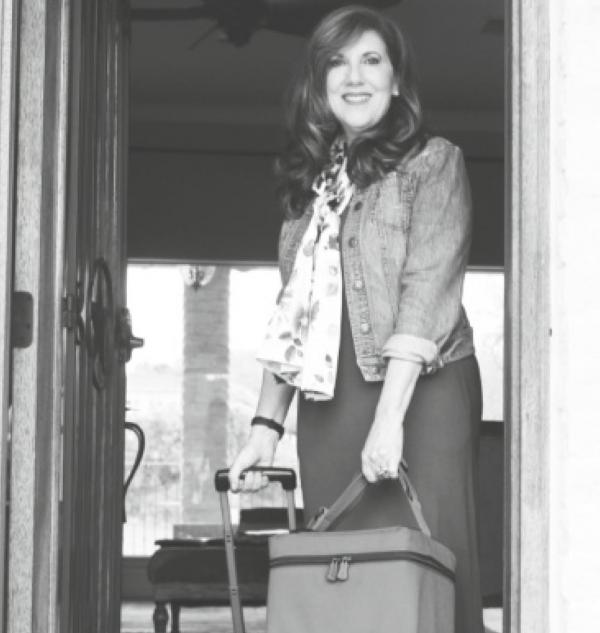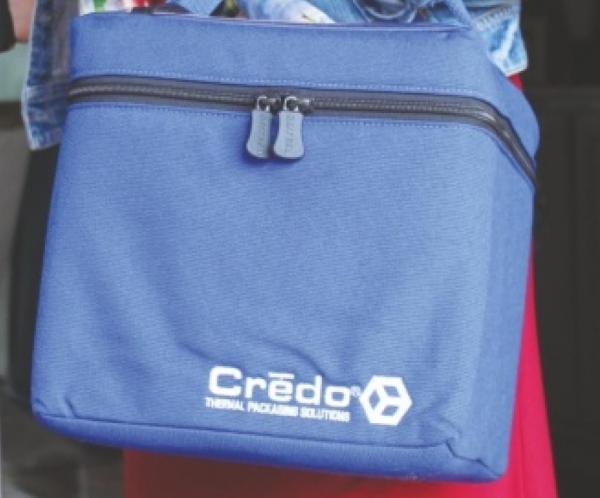Transporting bone marrow to help BE THE MATCH
When most people board an airliner they open the overhead bin and cram in a carry-on bag, a book and maybe a box of M&M’s.
When Becky McCullough gets on a plane — which is frequently — she uses the bin to save a life.
Becky transports stem cells and bone marrow to patients all over the world. She carries her precious cargo with her in an insulated cooler.
She volunteers her time with the Minneapolis-based Be The Match organization which matches bone marrow and stem-cell donors with people suffering from blood diseases.
Becky is not new to the world of bone marrow and stem cell donation. For 20 years, she was director of the bone marrow donation program in Houston. In 2013, she retired and shortly thereafter moved with her husband Mike to Wimberley. She still volunteers to make sure patients get the bone marrow they need.
“I have taken hundreds of trips all over the world,” says Becky. “I don’t even know how many.”
She’s in the United Airlines million-mile club.
The transplants works something like this: A patient with a blood disease, such as leukemia, is treated with radiation of chemotherapy to kill the diseased cells. Healthy, blood-forming cells from a donor are then injected into the patient’s blood stream and the new, healthy cells start to grow.
About 30 percent of the time a family member proves to be a good match for a transplant. Most of the time a donor is found through a complicated matching process with marrow donation organizations all over the world communicating and cooperating.
No time to waste
That’s where Becky comes in. She’s a courier. Once a match is made, she has to move fast. Sometimes she is delivering the cells to another country; sometimes she is bringing healthy cells back to the United States.
Most often a patient is treated with stem cells which, according to the Mayo Clinic, are “the body’s raw materials — cells from which all other cells … are generated. Under the right conditions, stem cells divide to form more cells called daughter cells.” Stems are gathered in a procedure much like giving blood.
Giving bone marrow is more complicated, requiring a hospital stay. Bone marrow is rich in stem cells and is more effective in some cases.
The cells are stored in a heavy duty plastic bag and look a lot like blood. They must be kept refrigerated so Becky carries an ice chest with her.
She has a “Freedom of Movement” letter explaining what she’s carrying. The cells get special treatment and can’t go through the x-ray machine.
The shelf life of bone marrow is between 48 and 72 hours so there’s no time to waste.
Becky recalls the time she got an email requesting her services at 4 p.m. on a Friday. By 2 p.m. on Saturday she was on her way to Germany.
“Once you pick up the cells, it’s go, go, go,” she says. “You learn to travel light.”
The Be The Match organization has its own travel service. Becky volunteers her time and Be The Match — through government grants and private donations — pays her expenses.
Each volunteer is required to take at least four international trips and three domestic trips annually.
Becky has had some adventures. She was in London in 2001 when Richard Reid, the so-called Shoe Bomber, tried to blow up a plane. The airport there was chaotic. In Hong Kong, she stumbled into the middle of a raucous freedom protest.
Trying times
With the coronavirus on the loose, travel has been a challenge. Two flights were cancelled on a recent trip from Austin to San Francisco. The airports, says Becky, are deserted and often there’s only one restaurant open.
“Airports must be the safest places to be right now. I was the only one in security. The whole airport was just empty,” she says.
There are some 400 volunteers in the U.S., “but some no longer want to travel (because of the virus) so Be The Match employees are being trained (to be couriers),” Becky explains.
Before the virus, Becky would usually grab a shuttle or a taxi to the hospital and hand over the cells. Then she’d get a hotel and spend a day or two seeing the sights. Now, things are different. Often a representative of the hospital where the operation is being performed will pick up the cells from Becky right at the airport. Becky kills a few hours in the airport before getting on her next flight home.
“Sometimes the trips are amazing,” she says. “And, sometimes they are not.”
The whole process is anonymous. All a donor might know, for example, is that the patient is a 32-yearold female. In the U.S. — if both sides are willing — a recipient can meet a donor after a year has passed.
Becky’s husband Mike knows the drill. “He goes with the flow,” she says. “He knows this is what I do and this is my passion. He never complains.”
There’s one more link between Be The Match and Wimberley. Cindy Payton, who makes protective faces masks locally, recently donated 100 masks to the organization.
If you are interested in finding out more about bone marrow and stem cells, want to volunteer or become a donor, call or 1-800-627-7692 or visit www.bethematch.org.



